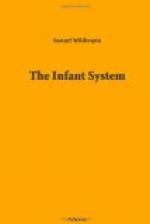The error of the past system (for such I hope I may venture to call it) as to mental development was, that the inferior powers of the mind were called into activity, in preference to its higher faculties. The effort was to exercise the memory, and store it with information, which, owing to the inactivity of the understanding and the judgment, was seldom or never of use. To adopt the opinions of others was thought quite enough, without the child being troubled to think for itself, and to form an opinion of its own. But this is not as it should be. Such a system is neither likely to produce great nor wise men; and is much better adapted to parrots than children. Hence, the first thing attempted in an infant school is, to set the children thinking,—to induce them to examine, compare, and judge, in reference to all those matters which their dawning intellects are capable of mastering. It is of no use to tell a child, in the first place, what it should think,—this is at once inducing mental indolence, which is but too generally prevalent among adults; owing to this erroneous method having been adopted by those who had the charge of their early years. Were a child left to its own resources, to discover and judge of things exclusively by itself, though the opposite evil would be the consequence, namely, a state of comparative ignorance, yet I am doubtful whether it would be greater or more lamentable than that issuing from the injudicious system of giving children dogmas instead of problems, the opinions of others instead of eliciting their own. In the one case we should find a mind, uninformed and uncultivated, but of a vigorous and masculine character, grasping the little knowledge it possessed, with the power and right of a conqueror; in the other, a memory occupied by a useless heap of notions,—without a single opinion or idea it could call its own,—and an understanding indolent and narrow, and, from long-indulged inactivity, almost incapable of exertion. As the fundamental principle of the system, I would therefore say, let the children think for themselves. If they arrive at erroneous conclusions, assist them in attaining the truth; but let them, with such assistance, arrive at it by their own exertions. Little good will be done, if you say to a child,—That is wrong, this is right, unless you enable it to perceive the error of the one and the truth of the other. It is not only due to the child as a rational being that you should act so, but it is essentially necessary to the development of its intellectual faculties. It were not more ridiculous for a master, in teaching arithmetic, to give his pupil the problem and answer, without instructing him in the method of working the question, than it is for a person to give a child results of reasoning, without showing how the truth is arrived at. But some, perhaps, will be ready to exclaim, “Surely the teacher should not withhold the benefit of his knowledge




